- Home
- Gore Vidal
The Golden Age: A Novel Page 2
The Golden Age: A Novel Read online
Page 2
The young assistant director approached Timothy. “We’re all set up in the library, Mr. Farrell.”
Timothy gave the AD his list of those who had agreed to speak to camera—for and against American participation in the European war. Blaise’s office at the Tribune had been happy to do the preliminary work. Thus far, no one had turned down Timothy’s invitation, particularly when they were told that the format would resemble Henry Luce’s March of Time, easily the most popular of all newsreel programs, a new one shown each month in every movie house in the land. But where The March of Time dealt with a subject for no more than fifteen or twenty minutes, Timothy and his sponsors—an eclectic mix that included pro- and anti-war investors as well as L. B. Mayer’s studio, MGM—were willing for him to make a ninety-minute feature that could then be cut into smaller segments. The voice-over narrative would be done by the notorious young radio actor Orson Welles, who had terrified the nation the previous year with his “reportage” of a Martian invasion of New Jersey. “I picked what I thought would be a perfectly incredible target for conquest. You see how wrong I was. Everyone believed that Martians lust for dominion over Passaic, New Jersey.” Then Welles agreed to narrate Timothy’s film. “We must call our film ‘War or Peace?’ ”
“Why not ‘Peace or War?’ ” Timothy suggested.
Welles grinned. “Less on the nose, I agree. I’m against Hitler, you know.”
“I’ll tell him, when I interview him.”
Welles’s eyes were suddenly very round and protuberant, like a vast Pekinese confronting dinner. “You’ve got Hitler? To interview?”
“Why not?” Timothy lied. He had been in the movie business almost thirty years, longer than the youthful Welles had been alive. But presently, after a prodigious number of stage and radio triumphs, Welles would be making his first film in Hollywood, after first narrating Timothy’s film. Meanwhile, Timothy’s muttered questions and asides would be the only narration in the library with its dark wood paneling and portrait of Aaron Burr over the fireplace. Later, Welles’s voice would be dubbed in.
The five-man film crew, as always when left on their own, had overlit the room. Timothy brought down the lighting, aiming for the sort of Götterdämmerung effect that he had first concocted for Caroline in her ill-fated Mary Queen of Scots. After first making a success of the nearly defunct Washington Tribune, she had followed her mentor William Randolph Hearst to Southern California, where each had made silent films, she as an unexpectedly popular actress, he as producer of the serial The Perils of Pauline. In due course, she had gone into partnership with the ambitious Timothy X. Farrell. Their Hometown series was still much admired. Then she had gone home to France and the freelance Farrell had turned to documentaries.
Timothy now relit Blaise’s library so that Washington statesmen would resemble the gods on Olympus, which was how they saw themselves and pretty much looked to be until they started to talk and one sadly realized that Jupiter, king of the gods, was just another saloon barfly, eager to buzz the new camera in town.
Timothy pulled a red leather wing chair into place beside the fire, noting contentedly that whoever sat in the chair would look agreeably diabolic if the key light were to be raised.
Blaise tapped on the door; then entered his now transformed study. “Looks like that movie you were doing when Frederika and I came out and stayed at the Ambassador.”
Timothy now realized that the first interview would have to be with his host. “All right, Blaise. Sit there, by the fire.…”
“But …” But Blaise had already seated himself in his throne: king of the gods. “Now, Tim,” he began.
But Timothy was already rearranging Blaise in the chair. Did he dare light each grandee in exactly the same way? Would that make the wrong point? After all, Senator Borah was pro-German. The newspaper columnist Walter Lippmann was pro-British. John Foster was exuberantly British. Senator Vandenberg was …
The Senator was standing in the doorway, drawn to camera as proverbial moth to flame. “Blaise.” He was portentous. “Is there …?”
“No. No.” Blaise turned to Tim. “Let Senator Vandenberg go first.”
But the gentleman from Michigan was firm. “Let me watch. I haven’t done a March of Time in months now. Not that this is the same thing, Mr …?”
Timothy shook the professionally outstretched hand. “Farrell. No, sir. This is a special ‘Peace or War’ documentary. Just a number of different points of view on whether we should help Britain or not.”
Timothy was aware of a tall fair handsome woman just back of the Senator. “So if you don’t mind the hot lights, why don’t you and Mrs. Vandenberg sit …”
“Mrs. Sims.” The Senator was smooth. “A dear friend of Mrs. Vandenberg’s. Her husband’s counselor at the Canadian Embassy.…”
As the couple made themselves comfortable on a sofa, Blaise gave Timothy a rapid wink. This then was the Senator from Michigan’s celebrated mistress, Mitzi, duly named in the notes that had been prepared for Tim by a dedicated researcher. One could never know too much about the players in a film, particularly a real-life one, involving—how unreal it suddenly seemed—the lives of millions of people. But, again, Timothy reminded himself to remain neutral. Between Hitler and the British, even a South Boston Irishman was inclined to the lesser of two evils. But then—the question he must never cease to pose—why should the United States be involved at all in yet another European war, twenty-two years after the depressing conclusion of their first Great War, in which over fifty thousand American soldiers had been killed while bringing the nation no reward other than the prohibition of alcohol for a dozen years, thus increasing crime as well as its punishment, and giving birth to a new and lawless land? No, he warned himself. Don’t impose. Be like the eye of God. Don’t judge. Don’t miss a thing.
Then, lights adjusted, he cued Blaise to speak to camera, which he did with almost the same professional ease as his sister Caroline, aka Emma Traxler, the exotic Alsatian star of the silent film Huns from Hell. Timothy fed Blaise few questions other than generalities. Could Hitler conceivably defeat France, much less England? Should we help France and England arm or remain neutral?
As part of Timothy’s preparation, he had read a year’s worth of Tribune editorials. The new phrase “Arsenal of Democracy” was acceptable, said Blaise, “but England must pay its way on a cash-and-carry basis.” No surprises.
Timothy looked through the camera’s lens; the picture was everything he had hoped. Blaise looked, if not Jovian, Olympian; perhaps Bacchic. So far so good. People seldom listened to professional public figures unless, like Roosevelt, the speaker had learned to talk very slowly with all sorts of oddly stressed emphases in order to be heard precisely as well as seen. Out of frame, in the shadows, Vandenberg’s bespectacled owl-like eyes were trained attentively on the scene as he sat up straight, allowing the loose parabola of his stomach to rest on thin gangling arms and legs held in disciplined place like the stiff starched collar that supported his bullfrog jowl.
Blaise spoke so smoothly that Timothy paid no attention to him. But then, as the film was changed, Blaise suddenly sat up straight in his chair, always a sign, Timothy had learned in the few “real-life” documentary movies he had done, that the speaker had started to think as well as resonate air.
Timothy took the clapper and clicked it an inch away from Blaise’s nose. “Blaise Sanford, November fourth, 1939. Take two.”
Blaise looked the camera in the eye. “All of my sympathies are with the Allies, as they were in 1914. I find particularly repellent Mr. Hitler’s regime, and though, in the long run, Stalin is the greater menace, I take it for granted that as we are too far away for Hitler to ever dream of attacking our shores, there is no danger to us in any foreseeable future. So thanks to geography, the Washington Tribune remains neutral with a natural bias to our allies in the last war, the first—and let’s hope last—World War.”
In the shadows, Vandenberg stirred. Timothy could smell M
itzi’s gardenia-based perfume.
“In the years since that war, we have been bombarded by books and films, by propaganda, if I may use the right word, to the effect that all war is a bad thing, since people do get killed. For close to twenty years we have been hearing how quiet it was on that western front. We’ve also been looking at morbid picture books of the dead and the dying in the trenches of France. A generation has been convinced that any war is some sort of historic error. Well, it’s very hard to interpret history as you live through it, day by day, as I have done. All I know for sure is that the curtain has gone up again on the second act of that grisly war. Once again France and England confront Germany. What are we to do? I can only hope that a generation overwhelmed with anti-war—with pacifist sentiments as the young are today will accept the fact that, should fate so ordain, we may yet, all of us, be called upon to fulfill our national destiny. But that time, thank God, is not yet here. I also trust that Mr. Roosevelt has the sense to realize how eighty percent of all Americans are against our taking sides, much less taking part, in the slaughter to come.” Blaise stopped.
“Cut,” said Timothy. “First-rate, Blaise.”
Vandenberg was on his feet applauding. “Never knew you were so sensible, Blaise. You sound just like me. Doesn’t he, Mitzi?”
“Particularly back home in Grand Rapids.” Mitzi was mildly sardonic. Timothy wondered what so … elegant seemed the word … a lady saw in this caricature of a Midwestern senator.
Blaise mopped sweat from his face. “Between the fire and your lights, I’m burning up. I must say I surprised myself. I left Franklin a loophole to get us into the war.”
Vandenberg shook his head. “I don’t think he’ll use your loophole once he’s made up that devious mind of his about what will help him most to get a third term. Well, we’re going to stop him dead in the Senate, at least in my Foreign Affairs Committee …”
“Yours, Van?” Mitzi was sharp. “You’re only the ranking minority member.”
Mitzi smiled at Timothy. Yes, he thought, she is attractive. So who is she …?
Vandenberg was now in the chair beside the fire. He was all clumsy expertise. As Blaise slipped out of the room, murmuring something about Senator Taft, Vandenberg was instructing the cameraman. “Could you go higher with your lens? I’ve got a bit of a chin problem.” He shook his pink ballooning jowls.
Timothy looked through his viewfinder. “Don’t worry, Senator, we’ll give you a bit more shadow on your left side. I can see you’re an old pro.” Timothy flattered the statesman much as he would the latest studio ingenue. The only essential difference between the professional and the amateur was that the professional was genuinely modest and tense while the amateur—ham, no other word—like Vandenberg was totally at home and at ludicrous ease.
Vandenberg tended to drone. He also liked to thrust his chin forward, belligerently, often at odds with what he was saying. He was, it quickly developed, a friend to the Allied cause in his heart, but in his head he believed only in Fortress America, a nation so powerful that Hitler would never dream of attacking its alabaster cities, its fields of amber grain.
“We must make ourselves strong militarily. We must not be isolationists.” The voice was grave and the spectacles shone in the firelight as he launched a phrase that, plainly, he thought would resound throughout history for all time. “We must be … insulationists!” A dramatic pause; then he bowed his head as Timothy said “Cut.” Briskly, Vandenberg turned to Mitzi. “I thought that was pretty good.”
“Superb, Arthur.” It was Timothy not Arthur who detected the irony in the word “superb.” What, he wondered, was their true relationship? Was she a spy, too? After forty-eight hours of Washington, D.C., Timothy had been told of a dozen secret agents, mostly working for England though several, apparently, served Germany. Since there was nothing much to spy on, their task, presumably, was to influence the national leaders to support whichever side the agent happened to be working for.
“The British are spending a fortune here,” said the isolationist Senator Robert A. Taft, thought by all to be next year’s Republican candidate for president. A bald, shy-mannered, professorial type with an unexpectedly tenacious manner, he was, in every way, a true opposite to his huge cheerful father, the twenty-seventh President, William Howard Taft.
“I plan to call for a Senate investigation of the various British and French agents here in Washington and, of course, New York and Hollywood. I have reason to believe that the editorial policy of the New York Herald Tribune is entirely dictated by the British secret services, with one aim only—to get us into the war on Britain’s side.”
Timothy collected a dozen “heads,” his name for those who spoke to camera. John Foster was exuberant and witty. “Of course I’m a propagandist for England. That’s because I am English, you see. Then, of course, we do need your help. That’s why we’re so awfully keen to get it. You know, at the embassy, each of us has been issued a cloak and a dagger. Also, let me warn you, we never sleep. Because we do want your ships and your planes but we don’t want your troops. Heaven forbid! Give us your arms—your legs too—and we’ll do the job. Think of us as your Bengal Lancers, fighting evil out there in the desert—or in the Tiergarten of Berlin.”
Timothy was struck that each of the others, excepting Taft, seemed to be holding back some vital piece of information. The interventionists were nervously aware that eighty percent of the country was unwaveringly isolationist. Those who opposed joining the war in Europe were careful not to seem in any way friendly to Hitler, and that included Borah, whom Timothy had last seen sixteen years earlier in this same library; he was then very much in his leonine prime and famous for his proud boast “I’d rather be right than president,” as well as for his affair with the volatile Alice Roosevelt Longworth. She had borne him a daughter, a situation calmly accepted by her husband, the speaker of the House, Nick Longworth, who had raised the child as his own. Now Longworth was dead; the Lion was moth-eaten while Alice was by far the best of the talking heads.
Timothy filmed her last. “Of course, Cousin Franklin is going to get us into the war over there so he can run for a third term next year. Two terms were good enough for my father, not to mention George Washington, and two terms are more than good enough for him if not for the long-suffering American people. But …” Dramatically she narrowed her gray-blue eyes. “Let me tell you a secret. Franklin is very ambitious. There! I’ve given the game away. He wants to be president for life and if it takes a war to keep him in the White House forever, a war we shall have!”
Thank God for Alice. Timothy found himself grinning with pleasure; she was a born star. She was also the last on his list, and so he escorted her back into the party. “Do you really think he’s working to get us into the war?”
Alice had switched off her charm. The huge Roosevelt teeth were now covered by thin lips that made her mouth seem sulkily protuberant. “Yes.” The answer was curt. “They say my father loved war. I think it was adventure that he loved. But those were simple days, fighting savages, far, far away. The 1917 business should have taught us a lesson. But all Franklin learned from Wilson was that war gives you the powers of a dictator. War can also win you an election, particularly if you swear to the American people that you’re in favor of peace as Wilson did in ’16 and Franklin will next year.”
“But the people …”
“Always do what they are told. They have no choice, I suppose. I can’t think why Hitler and Stalin go to such trouble with their secret police to keep people in line when all you need is just one Walter Winchell or just one darling Helen Reid at the Herald Tribune to spread British propaganda.”
“But the people don’t really fall for it.”
“By the time Franklin’s been reelected, they will. Don’t worry. Something will have happened.”
“Like ‘Remember the Maine’?”
“Not if I can help it.”
Senator Taft was standing next to them. “Sorry,
Alice, I was eavesdropping.”
“Quite all right. You and I think alike. And we’re always right.”
Taft introduced them to a smiling, silver-haired man. “Ralph Williams. He thinks he’s running me for president, even though I’m standing as still as I can.”
Timothy noted a twinkle in Taft’s eye, not visible thus far in his career to any camera’s eye. Some people projected charm like Alice and the President; others rejected charm, like Taft.
“We’ve got the nomination pretty well wrapped up,” said Mr. Williams. “Mrs. Longworth, I certainly hope you’ll make a speech for us at the convention …”
“I’ll speak. But only in Theodore Roosevelt’s name. You’re all we’ve got, Bob.”
“There’s Arthur Vandenberg.” Taft looked very grave.
“Poor Arthur’s the only man I know who struts sitting down.” They laughed at the old joke. But Alice had yet another turn to the screw. “We’re the party of America First. The party of staying out of European messes. But Arthur is leaving us. Can’t you see? The Senator from Michigan is one of us only for now but by next summer the Senator from Mitzi-gin is going to be an all-out interventionist. He’s hooked.”
Taft looked somewhat ill at ease. Plainly sexual gossip offended his native gravitas. But Timothy was now beginning to understand the odd tension between Vandenberg and his mistress in the study. “I don’t think a lady, no matter how charming …”
“And devoted,” said Alice, “to England, could not not get him to switch sides.”
It was the dignified Mr. Williams who underscored the argument. “It is well known, I’m afraid, that the fabulous Mitzi is a British agent, specifically assigned to convert the Senator.”
“I ought not to be listening to this.” Senator Taft joined the crowd that was now moving toward the dining-room buffet, where the season’s novelty was on display, hickory-smoked turkey, courtesy of Smithfield.
“Let me take you in.” Frederika took Timothy’s arm. “When will we see this documentary of yours?”

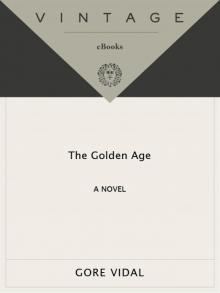 The Golden Age: A Novel
The Golden Age: A Novel Death Before Bedtime
Death Before Bedtime Burr
Burr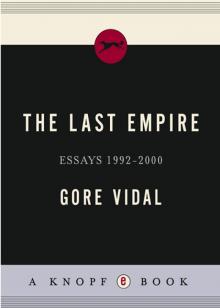 The Last Empire
The Last Empire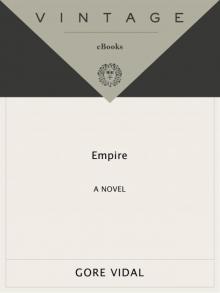 Empire: A Novel
Empire: A Novel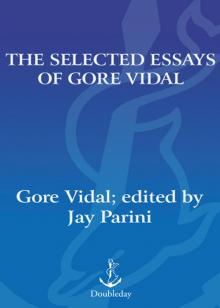 The Selected Essays of Gore Vidal
The Selected Essays of Gore Vidal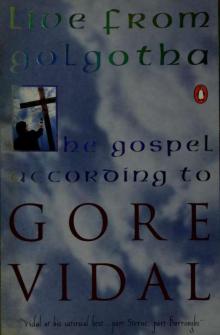 Live From Golgotha
Live From Golgotha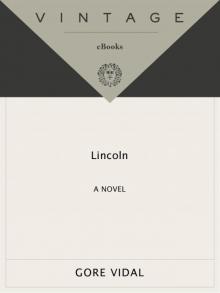 Lincoln
Lincoln Death Likes It Hot
Death Likes It Hot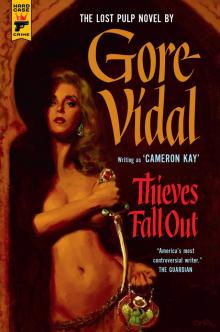 Thieves Fall Out (Hard Case Crime)
Thieves Fall Out (Hard Case Crime)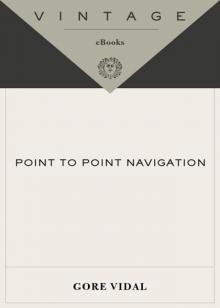 Point to Point Navigation
Point to Point Navigation Williwaw
Williwaw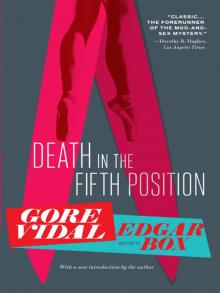 Death in the Fifth Position
Death in the Fifth Position In a Yellow Wood
In a Yellow Wood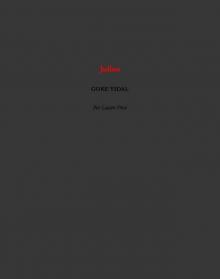 Julian
Julian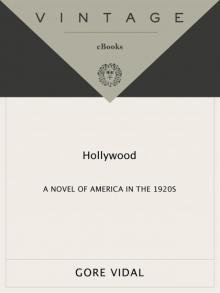 Hollywood
Hollywood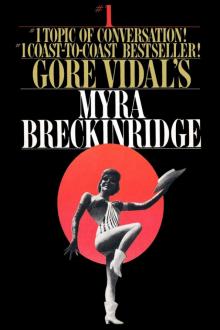 Myra Breckinridge
Myra Breckinridge Messiah
Messiah The Second American Revolution and Other Essays 1976--1982
The Second American Revolution and Other Essays 1976--1982 Homage to Daniel Shays
Homage to Daniel Shays Empire
Empire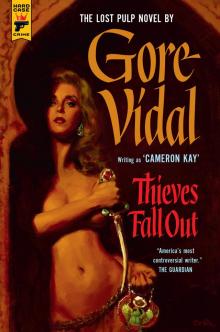 Thieves Fall Out
Thieves Fall Out 1876
1876 The City and the Pillar
The City and the Pillar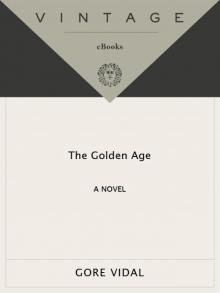 The Golden Age
The Golden Age At Home
At Home